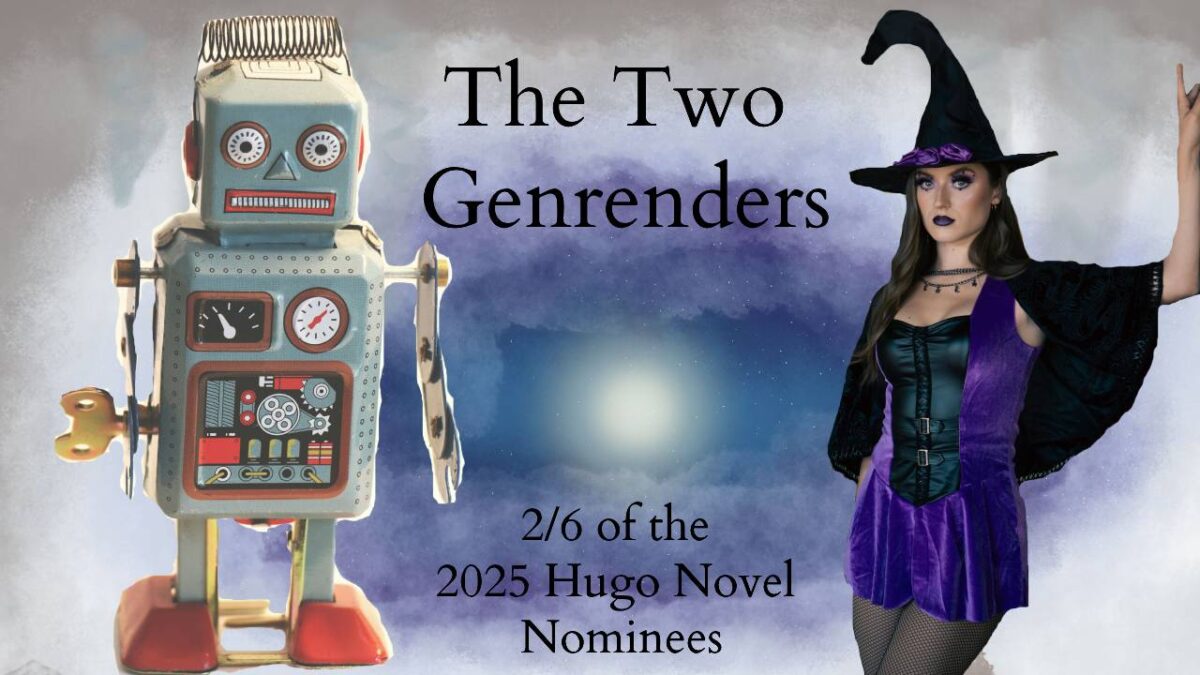I’m trying something new this year to take my mind off the horrors: I’m going to read all the 2025 Best Novel Hugo nominees. Probably not in time for the actual awards ceremony, but you never know. How hard can it be to read six books by August…
Service Model by Adrian Tchaikovsky
Though I know him by his reputation as an exceedingly prolific genre writer, I had never read an Adrian Tchaikovsky novel until a few days ago, when I finished Service Model, one of his two(!!) novels nominated for the 2025 Best Novel Hugo. I actually wanted to read Alien Clay but couldn’t get it, so I picked up Service Model instead, with some trepidation.
Service Model tells the picaresque story of a valet robot, Uncharles, who finds himself spat out into a strange, fallen world after the suspicious death of his master. The tone of the book is rather wry, juxtaposing the dystopian circumstances of Uncharles’ world with the unflagging propriety programmed into him. I’m not generally very high on aggressively comedic novels, unless they’re exceedingly dark or dry. While I love Catch-22, I’ve never quite clicked with books like Hitchhiker’s Guide to the Galaxy. And the first section of Service Model had me nervous, as the absurd opening scenario’s tortured robot logic tried hard to be broad and silly. However, Tchaikovsky’s sharp and digestible writing style made the pages move quickly, and once I got into the second section I began to enjoy the book more.
Where Service Model shines most brightly is in Uncharles’ development as a character. Each surreal situation Uncharles encounters changes him in significant ways. Some elements of this change are telegraphed broadly (he begins the book named Charles), but in other ways Uncharles’ development unfurls subtly, making each new challenge he faces an interesting test of whether he will turn away from his core servile functions. Uncharles’ humility and preprogrammed obsession with service make him a refreshing protagonist for science fiction, a genre overrun with libertarian ubermenschs who can’t move ten feet without flexing about their independence and chadly nature. Watching him grow from a being addicted to service, even to cruel masters, into someone who offers his care specifically to someone he loves is quietly powerful.
Indeed, I found the second half of the novel, especially its conclusion, to be the strongest part of the book. As Uncharles’ journey meanders into darker and darker scenarios, the humor of the book feels more necessary and the significance of Uncharles’ humility greater. It’s in this later section that Tchaikovsky most directly engages the vast Problems of Our Times, weaving the parable-like story of Uncharles into a critique of the current zeitgeist for shifting critical labor onto machines who can’t choose or desire for themselves. A key character introduced near the book’s conclusion delivers blistering polemics on the risks of this voluntary shirking of human responsibility, a harsh moral that is delivered intertwined with a second, kinder corollary about the value of mercy over cold justice. The climactic struggle (expressed both physically and philosophically) between the gentle Uncharles and the harsh remnants of the old world paid off the earlier, less interesting portion of the book.
I enjoyed Service Model, and its commentary on Our Times satisfied my desire for an award nominee to be at least Medium Deep. I will read more of Tchaikovsky’s work.
A Sorceress Comes to Call by T. Kingfisher
I did sincerely set out to enjoy A Sorceress Comes to Call. I’ve always heard good things about T. Kingfisher’s writing, and despite the back cover advertising A Sorceress Comes to Call as a fairy tale reimagining (sigh and sigh), I began my approach to the novel with interest.
The early chapters introduce the reader to Cordelia, a traumatized young teen whose mother uses her sorcerous powers to abuse and control Cordelia (among others), and Hester, a good-hearted but curmudgeonly member of the lesser gentry whose brother becomes the latest target of Cordelia’s mother’s gold-digging ways. Hester and Cordelia are both likable viewpoint characters, and Kingfisher captures Cordelia’s victimization by her cruel mother with genuine poignancy.
This was a promising start! But the work as a whole ultimately did not cohere for me. The plot grinds awkwardly into gear, the early energy of the story giving way to a somewhat plodding series of faux-Regency dinner and parlor scenes in which characters talk about what might happen and what they might do about it and what they might feel about it, without the wit and subtlety of literature actually from that period.
And the book’s period setting also disappointed me. The worldbuilding is about as dense as a slice of fancy prosciutto: that is to say, when I hold it up to the light, I can see through it. Hester and Cordelia inhabit a British-tinged world of etiquette and strategic marriages, but there is no specificity to it and no grounding. Clothing and other period indicators are left vague in description, ‘lest the reader discern whether this world is more Regency or more Victorian. The Church is a Christian one, but without any distinguishing qualities of denomination or belief that would inform character behavior. There may or may not be a king or a parliament, but no one ever feels like discussing them. Why are these gentlefolk rich? How do they maintain themselves? These are questions which fascinated the writers of the actual Regency and Victorian eras, but which our contemporary authors prefer to handwave. I admit to some bias here because of my general disgust with the category of recent media I’ve taken to calling “New Aristocracy Apologia”, a chasm into which most undercooked depictions of Old British Times fall.
Yes, now there will be a blog post on New Aristocracy Apologia.
But my core criticism returns to the book itself: as A Sorceress Comes to Call went on, its poignancy faded. I felt as though Kingfisher pulled several punches, leading to a climax which resolved so neatly and cleanly that I never really feared for the characters. The only major character killed by the villainess is quickly recouped via convenient supernatural means so that she can have a bigger, more heroic death later. I’m not convinced that the fantasy elements added much to the narrative at all: while the plot would certainly be different without them, they do not drive the narrative to a new kind of meaning, beyond the first few chapters where the sorcery evokes the particularities of parental abuse to a chilling effect. But the strength of that metaphor fades over time as meandering plot takes over.
To be clear, I do not think this is a bad book per se. The writing moves along, entertaining and comprehensible, and each major character speaks with a distinctive and recognizable voice. I appreciated having two female protagonists, both of whom were active, well-defined, and interesting up until they only acted in ways I completely expected. The book is reasonably entertaining, though I would have enjoyed more if it were half as long and didn’t give me as much time to think about being underwhelmed. Unfortunately, this is an unforgiving world and I am an unforgiving girl, particularly when I’m reading something because it’s an award nominee. A Sorceress Comes to Call does not offer a particular perspective on the topics it takes up other than “child abuse and manipulation are bad”, and in that way it is fundamentally Not That Deep.
Having checked one-third of this year’s Best Novel nominees off my list, I feel very medium about this year’s slate. Service Model proved a pleasant surprise, but was more confirmation bias than galactic brain in its reflection of our tattered society. A Sorceress Comes to Call lacked the intellectual rigor to reflect much at all, a statement which is true but also betrays me as the kind of d-bag who reads for intellectual rigor (as if you didn’t already know).
Luckily all the other 2025 Hugo nominees at my library are checked out, so I have a few weeks for my disgruntlement to fade. Hope, please spring eternal.

